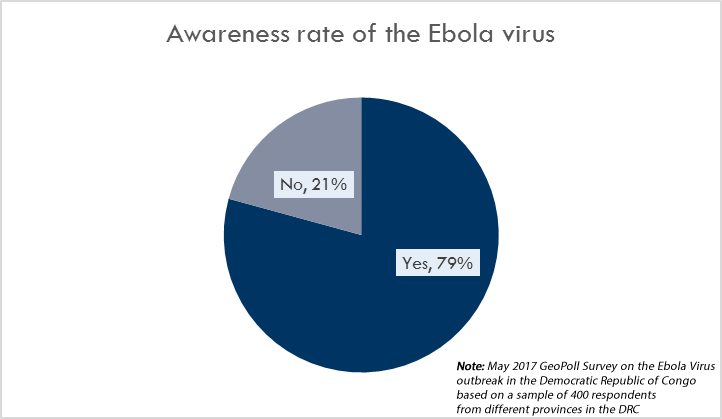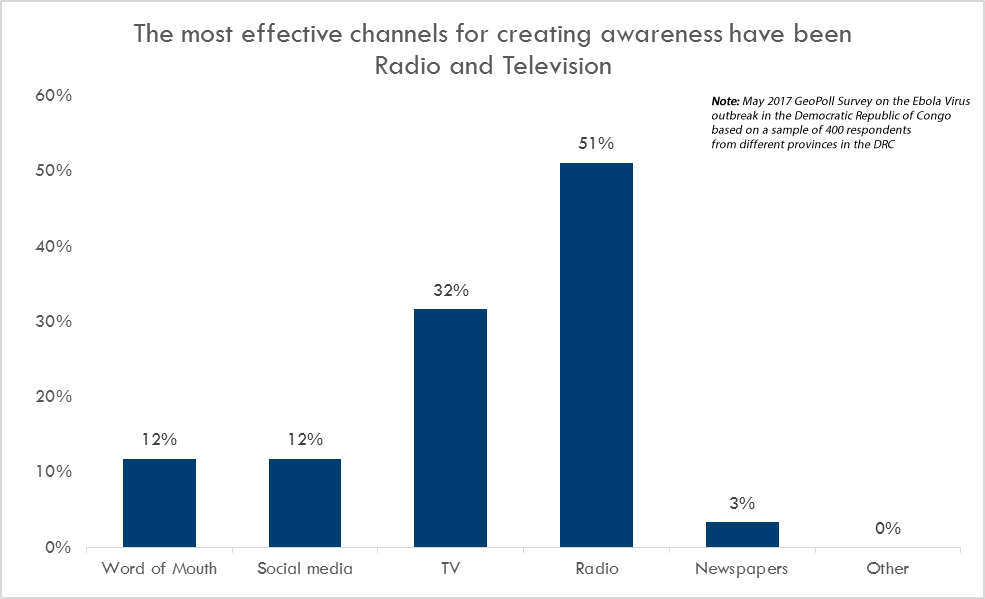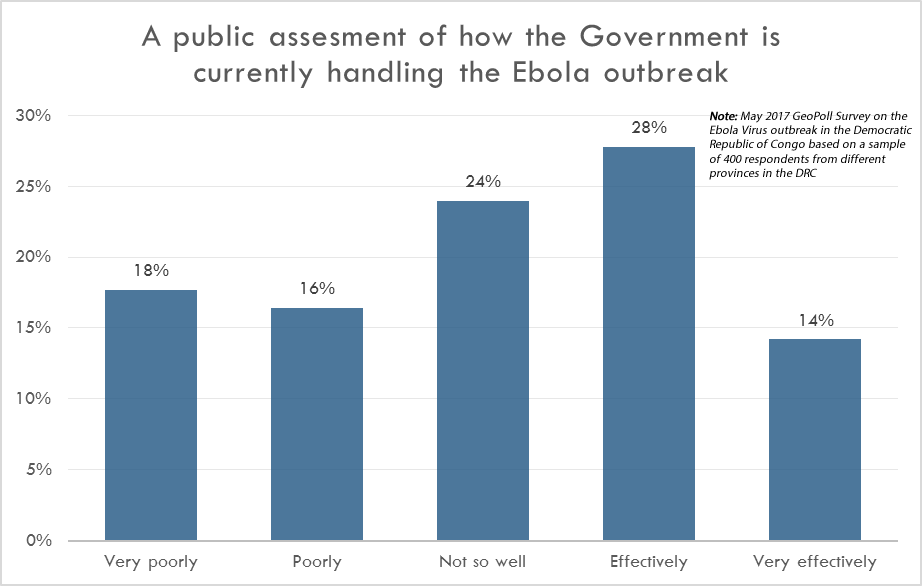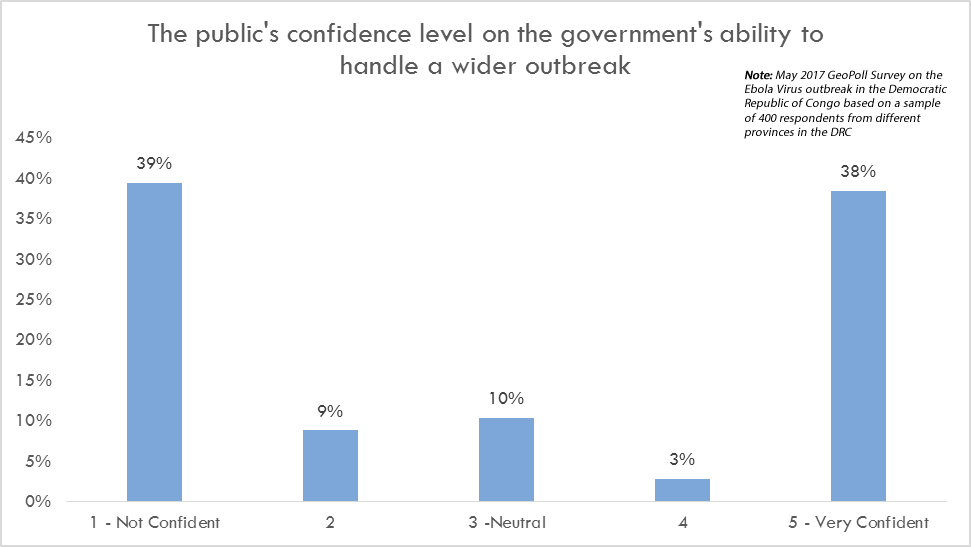Most Congolese do not believe that hospitals and the government are handling the current outbreak effectively. Most are also not very confident in the government’s ability to handle a wider outbreak. This is according to a GeoPoll survey run in the Democratic Republic of Congo concerning the recent Ebola outbreak that occurred in the country.
According to the World Health Organization (WHO), since 22nd April 2017, nine cases including three deaths have been reported in the Bas Uele Province north of DRC bordering the Central African Republic.
On May 29th and 30th 2017, GeoPoll targeted 400 respondents from the different provinces in the DRC with the objective of identifying and measuring; the level of awareness on the virus, its outbreak, spread, prevention and sentiments on the effectiveness. GeoPoll also sought to collect public sentiments on the preparedness of hospitals and the government in handling the outbreak.
Awareness of Ebola Virus and its outbreak in DRC
There is a high level of awareness of the Ebola virus and its outbreak in the country.

When asked, “Are you aware of Ebola?” 79% of respondents said they were aware of the disease while 21% indicated they were not. Out of the 79% respondents who were aware of the Ebola disease, 86% were aware of the current Ebola outbreak in the DRC.
This high level of awareness is a positive sign as one can hypothesize that due to this, the spread and lethality of the disease will be less than compared to the 2015 Ebola outbreak in Guinea, Sierra Leone, and Liberia.
Radio and TV are the two media channels that have played a huge role in spreading awareness among the DRC population on the virus and its outbreak. The top three information sources for those who are aware of the Ebola outbreak in the DRC are radio (51%), TV (32%), and the word of mouth and social media (12% each).

Among female respondents, the top information source regarding the outbreak is TV at 40%. For males, the top information source is the radio at 65%.
GeoPoll asked respondents who were aware of the Ebola virus the different modes in which the disease can be transmitted. 76% of respondents indicated direct contact with bodily fluids of infected persons, 13% said touching the clothing of an infected person. 5% of respondents indicated that the disease was spread through a different mode.
This ability to tell exactly how the virus is spread points to a clear discernment between facts and myths about the virus spread among the respondents which means that they would know how to avoid its contamination or spread.
Levels of risk & prevention
Whilst over a majority of respondents do not feel at risk, one in four people feel at risk. When asked, “Do you believe you are at risk of being exposed to the Ebola virus?” 63% of respondents replied no and 38% replied yes.
Among respondents who are both aware of the Ebola disease and feel that they are at risk of becoming infected with the disease, the average score to the following question, ” On a scale of 1-5, where 1 being not concerned and 5 being very concerned, how concerned are you about getting the Ebola Virus”, was 3.11.
This demonstrates that amongst this concerned subgroup of respondents, the concern for getting the disease leans more towards the ‘very’ concerned side, then ‘less’ concerned.
GeoPoll asked respondents who were aware of the Ebola disease if they knew how to prevent themselves from contracting the disease. 58% of respondents indicated that they know how to prevent themselves from contracting Ebola, while 42% do not know how.
This data point demonstrates that there is still room for better Ebola prevention campaigns in the DRC.
The role of the Government & Hospitals
Most survey respondents do not believe that hospitals and the government are handling the current outbreak effectively. Most are also not very confident in the government’s ability to handle a wider outbreak.

When asked, “How well do you believe the hospitals are handling the current outbreak situation? 1) Very poorly 2) Poorly 3) Effectively 4) Not so well 5) Very effectively” out of respondents who were aware of Ebola, 42% of respondents believed the hospitals were being effective. 27% of respondents replied not so well, and 31% believe the hospitals are handling the current outbreak poorly.
Among male and female respondents, one sees a major difference in opinions when it comes to how ‘effective’ the hospitals are being. For male respondents, 25% said the hospitals are handling the current outbreak effectively, while for female respondents it is 36%.
For respondents who are aware of the Ebola disease, 42% believe the government is handling the current Ebola outbreak effectively. 58% believe the government is not handling the current outbreak effectively.
GeoPoll asked respondents who were aware of Ebola, “On a scale of 1-5, where 1 being not confident and 5 being very confident, how do you feel about the government’s ability to handle a wider outbreak.” The average score amongst the respondents was 2.9, indicating that among these respondents, they are barely leaning towards the very confident scale as compared to not confident.

Points of intervention
This survey has determined the level of awareness on the virus outbreak and top information sources for both genders. Now agencies can be more effective in how they target their Ebola prevention interventions.
Having one in four people feel at risk though not alarming is still fairly high. This increases the need to be able to design, implement, monitor and evaluate all intervention programs to ensure that fewer people feel at risk of becoming infected with Ebola.
There is a need for hospitals and the government to play a bigger role in instilling more confidence by demonstrating their ability to better handle the Ebola outbreak more effectively and more importantly, the government’s ability to handle a wider outbreak.
Finally, radio and TV are mediums that can be tracked via surveys, allowing agencies and other parties to measure the effectiveness of their interventions.
Data Collection & Methodology
GeoPoll is a mobile surveying platform that used SMS to collect data from mobile phone respondents in the DRC. The GeoPoll platform connects directly with mobile network operators (MNOs) in the DRC to collect data over their own networks. Participation is always free and voluntary to the respondent.
Over a period of two days, GeoPoll had 400 respondents answer the survey and provide insights into Ebola awareness, general knowledge of the disease, and how the government is responding to the challenge. All 400 respondents took the survey in French and the sample is representative of respondents with access and the ability to answer a mobile survey in the DRC. There was a 50/50 split among male and female respondents. The margin of error for this survey is 4.9.
(Photo source; YouTube)



